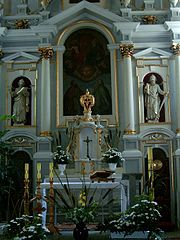
A History Of The Mass And Its Ceremonies In The Eastern And Western Church -Rev John O'Brien A.M.
MASS MUST BE CELEBRATED FASTING
According to Cardinal Bona (Rer. Liturg., p. 255), the practice of celebrating fasting is of apostolic origin, and was always strictly observed in the early Church. St. Augustine says that, out of respect for the Holy Eucharist, we should partake of no food whatever before communicating. To this rule there was, however, one signal and special exception in ancient times—viz., in case of the Mass celebrated on Holy Thursday. On this day, in memory of the Last Supper, it was customary for some years, at least in Africa, to celebrate after having taken food. The decree regulating this discipline, and issued by the Council of Carthage in A.D. 397, was thus worded: “The sacrament of the altar must not be celebrated unless by those who are fasting; an exception, however, is made on the anniversary upon which the Lord’s Supper was instituted” (ibid.) Some claimed an exception, also, in case of Masses for the dead, but the practice gained but little favor. To-day the rule enjoining fast is of universal obligation, and admits of no relaxation, except in one or two special cases—viz., where an accident should befall a priest after consecration, rendering him unable to go on any further, and there is no other priest at hand to complete the Sacrifice but one who has already broken his fast. Some theologians make another exception in the case where people had been deprived of Mass for a long time, and could not, on account of their great distance from church, be early enough for the regular Mass. But as such things rarely happen, they are hardly exceptions to the universal rule.
Practice of the Eastern Church in this respect.—We have said in another place that the Copts will say Mass any time of the day or night, whether fasting or not, in order to give Holy Viaticum to the dying, as they do not reserve the Blessed Sacrament. This, however, must be considered a solitary case, for the discipline of all the Oriental churches in this matter is precisely the same as our own.
According to many of the Coptic and Ethiopic disciplinary canons, the priest who is to say Mass must be fasting from the previous evening, and must not even take a glass of wine before he has celebrated (Denzinger, Ritus Orientalium, p. 66; Renaudot, Liturg. Oriental., i. 268). So fearful are they of violating this sacred law that it is quite common to find a priest taking up quarters in the sacristy the previous day, and remaining there, secluded from all danger of breaking the fast, until Mass has been celebrated.

 Support Site Improvements
Support Site Improvements